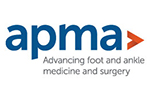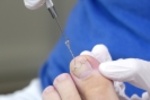News Archives

Safeguarding Foot and Ankle Care in DC
APMA and DCPMA are advocating for DPMs regarding a proposal before the DC Council Committee on Health that if approved could have a significant impact on podiatric physicians and patients in the District.

APMA Submits Recommendations to CMS on Medicare Advantage Program on Supplemental Benefits and Prior Authorization
On January 5, APMA submitted comments to CMS Policy and Technical Changes to the Medicare Advantage and Medicare Prescription Drug Benefit Programs Proposed Rule, and in particular to respond to the proposed rule referenced above addressing supplemental benefits for the chronically ill and prior authorization.

In Memoriam: Terence B. Albright, DPM
APMA is deeply saddened to share that Past President Terence Albright, DPM, passed away at the end of December. He was the 2005 recipient of the APMA Distinguished Service Citation, APMA's highest honor.

APMA Expresses Concerns to the ONC and CMS in Response to Proposed Information Blocking Disincentives for Providers
Last month, APMA submitted comments to the Office of the National Coordinator for Health Information Technology (ONC) and CMS, in response to the proposed rule, “21st Century Cures Act: Establishment of Disincentives for Health Care Providers That Have Committed Information Blocking Proposed Rule.”

Dr. Abshier appointed to serve as the HCPAC Representative to the CPT Editorial Panel
In December 2023, Sarah Abshier, DPM, APMA’s CPT alternate advisor, was appointed to serve a four-year term representing the Health Care Professional Advisory Committee (HCPAC) on the CPT Editorial Panel.

2024 CPA Innovation Grant and Financial Assistance Grant Recipients
The APMA Center for Professional Advocacy (CPA) is delighted to announce that it is awarding six state components 2024 Innovation Grants, as well as awarding two states 2024 Financial Assistance Grants.

Advocacy Success! Palmetto Surgical Treatment of Nails
Following comments from APMA (submitted in conjunction with AAD) and testimony from Palmetto state CAC representatives, Palmetto has modified the restrictions it proposed in its Proposed Surgical Treatment of Nails Policies, which take effect January 21, 2024.

Dr. Christina to Retire in 2024
APMA Executive Director and CEO James R. Christina, DPM, has announced that he will retire on March 31, 2024. Dr. Christina has been executive director since 2015, and previously served as director of Scientific Affairs for a decade.

MGMA Compensation and Production Survey - Now Open, Submit Data by February 23, 2024
Do you want data that can help you negotiate a higher salary in your next job or benchmark your own performance? APMA is delighted to continue its yearly partnership with MGMA, offering valuable data to our members.

New Codes For Lymphedema Compression
APMA previously shared that effective January 1, 2024, ready-to-wear, gradient compression garments will be covered for the treatment of lymphedema, including in the absence of an open ulcer.

APMA Comments on Healthy People 2030 Objectives
Last week, APMA submitted comments providing feedback on the current Healthy People 2030 objectives set by the US Department of Health and Human Services Office of Disease Prevention and Health Promotion.

Update Medicare Clinician Payment: APMA Members Encouraged to Participate in the Clinician Information Survey
The Clinician Practice Information (CPI) Survey, a partner survey to the Physician Information Survey (PPI) will soon be underway, and APMA members are encouraged to engage in this effort.

APMA is Moving!
APMA Executive Director and CEO, James R. Christina, DPM, has an important update for members about APMA headquarters.

APMA Provides Comments at the Diabetes Mellitus Interagency Coordination Committee Meeting
On November 16, Paul Kesselman, DPM, Health Policy and Practice Committee member and chair of APMA’s DME Workgroup, presented remarks representing the American Podiatric Medical Association during the National Institutes of Health (NIH) Diabetes Mellitus Interagency Coordination Committee (DMICC) meeting.

Reimbursement Concerns Discussed at CAC-PIAC Meeting
The 23rd Annual CAC-PIAC Representatives Meeting was held in Alexandria, VA, on Friday, November 10. More than 50 volunteer member leaders from across the country gathered for education and collaboration.

Major Advocacy Win: AUC Rescinded!
Following APMA advocacy, CMS rescinded the regulations regarding appropriate use criteria for advanced diagnostic imaging in the 2024 Physician Fee Schedule Final Rule.

APMA Responds to HHS and OCR on Proposed Updates to Accessibility Standards and Requirements
APMA recently submitted comments to the Office for Civil Rights (OCR) under the Department of Health and Human Services (HHS), in response to its proposed rule, “Discrimination on the Basis of Disability in Health and Human Service Programs or Activities.”

Have You Seen These FREE CECH Courses?
As an APMA member, you have access to several complimentary CECH courses through the APMA Online Learning Center. Check out these recent additions.

MIPS Impact to 2024 Medicare Payments–RESPOND By November 13!
APMA has heard from several members that for the 2022 performance year, they received a score for the MIPS cost category. Specifically, members were scored on the Diabetes episode-based cost measure, which in some cases negatively impacted their overall performance for 2022, which could reduce their Medicare payments in 2024.

CMS Unveils 2024 MPFS Final Rule; AUC Rescinded
CMS released the CY 2024 Medicare Physician Fee Schedule (MPFS) Final Rule on November 2. APMA is currently reviewing the rule and will provide full analysis, as necessary.